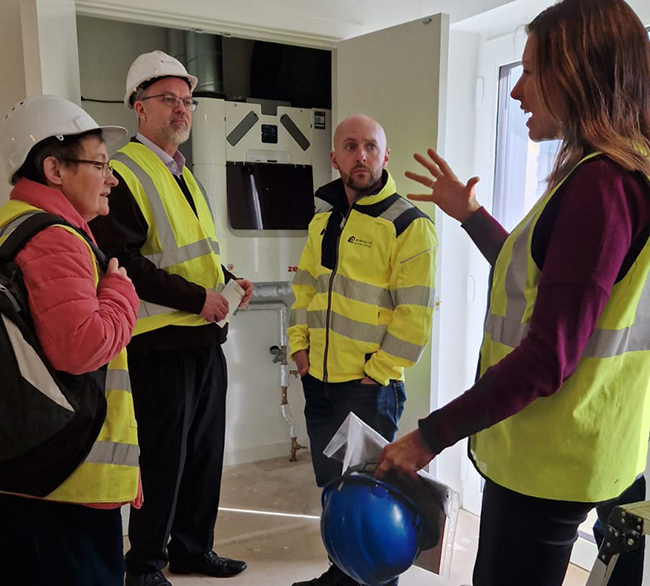
By Stefan Huber, MD, PAUL Heat Recovery Scotland
THE Scottish Government is about to undertake a second consultation on its proposed Scottish Passivhaus equivalent policy for new-build housing across Scotland, with the exact policy details still to be announced.
The Passivhaus standard offers fuel-bill-busting levels of energy efficiency, reducing heating energy demand in homes by 79% compared with current Scottish building regulations, while also delivering high levels of occupant comfort and health. Mechanical ventilation with heat recovery (MVHR) is an essential feature of Passivhaus homes and buildings.
MVHR – a growth market
PAUL Heat Recovery Scotland has been designing, installing and maintaining MVHR systems in Scotland since 2008. We operate from a Dunfermline base and have grown from three staff to 19, working on projects ranging from one-off self-build projects to large-scale social housing schemes, including those for Midlothian Council and the Springfield Cross project in Glasgow. We are seeing demand for MVHR ventilation systems growing year-on-year, and with the Scottish Government’s proposed Passivhaus equivalent legislation, this is only going to increase.
What is MVHR?
Mechanical ventilation with heat recovery (MVHR) works by recovering heat from stale, used air (e.g. from bathrooms and kitchens) and transferring it to fresh incoming cold air. The stale air still goes out, but its heat is re-used. In summer, a summer bypass mode ensures that if the outside air is cooler than the internal temperature, the cooler external air is brought directly into the building, without being heated by the outgoing warmer internal air. MVHR makes a significant contribution towards a building’s energy savings, as well as improving occupant comfort and indoor air quality.
MVHR is a relatively simple piece of technology and uses little energy to run. It is the only form of ventilation that cuts out almost all of the heat losses that come from ventilation (e.g. opening windows or trickle vents), which can make up to 30% of a home’s heating demand. Research has shown that the average indoor air quality in modern homes ventilated only with natural ventilation via trickle vents can be alarmingly poor.
Upskilling Scotland
Despite the fact that a growing number of tradespeople have embraced the opportunity to upskill in Passivhaus, there is still an urgent skills gap for training in all aspects of ventilation and Passivhaus.
Good MVHR design and installation are crucial to ensuring a quiet, efficient, and well-running operation. Passivhaus certification does offer quality assurance on this, including checks and balances on MVHR installation. However, this needs to be backed up by good installer training.
PAUL Heat Recovery is partnering with Forth Valley College to deliver BPEC-accredited Domestic Ventilation installer training on a course starting on 22nd October 2025.
We’d like to see the development of mandatory training for everyone who installs and commissions MVHR systems, taken to the colleges across Scotland as part of plumbing and electrical trade courses. To deliver on its Passivhaus equivalent plans, the Scottish Government will need to help build capacity for ventilation installation training.
The Passivhaus Trust has instigated the formation of a working group to develop Intermediate level MVHR installer training and embed this within the existing qualification structures, needed to support the Scottish Passivhaus Equivalent policy. PAUL Heat Recovery Scotland has been asked to be a technical adviser to this group bringing our specialist installer knowledge and industry expertise.
FREE breakfast seminars this autumn
As part of our work to help with the MVHR upskilling of Scotland’s construction industry, PAUL Heat Recovery Scotland is co-hosting breakfast seminars in Edinburgh (29 October 2025) and Glasgow (25 September 2025) that will explore the domestic heating and ventilation technologies suitable for Passivhaus and Scottish Passivhaus Equivalent homes. Guest speakers from Passivhaus Trust will also be joining us sharing updates on the Scottish Passivhaus Equivalent Policy and the future of housing in Scotland. We hope you can join us!
The Scottish Government’s support for the Passivhaus equivalent is a very positive move for Scotland, demonstrating admirable climate leadership. Scotland’s construction industry clearly needs to upskill in readiness for the Scottish Passivhaus Equivalent policy. A transition period for implementation has been put forward to allow industry time to adjust. As a company, we will do all we can to help this transition.








